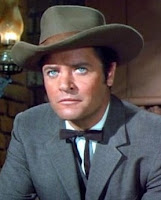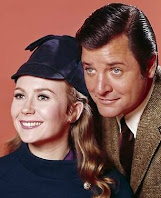1. In his film debut, Richard Long played the adult illegitimate son of Claudette Colbert and Orson Welles in the 1946 drama
Tomorrow Is Forever. He was fifth-billed in the cast, which also included George Brent, Lucille Watson, and Natalie Wood as Orson's eight-year-old foster child in the movie. Incidentally, Long acted opposite Welles in his follow-up film
The Stranger, which Orson also directed.
2. Richard Long's fourth film provided him with his most famous film role. In The Egg and I, he played Tom Kettle, the oldest son of the quirky country couple Ma and Pa Kettle (Marjorie Main and Percy Kilbride). The Kettles stole the movie from stars Claudette Colbert and Fred MacMurray and earned their own film series. Starting with Ma and Pa Kettle (1949), Long appeared in four of the nine Kettles films as Tom, a bright young man who eventually attends Washington State University, gets married, and moves to New York City.
3. Richard Long's first significant television role was as Gentleman Jack Darby in four 1958-1959 episodes of Maverick. Darby was a fugitive wanted for embezzlement. Though he was innocent of that crime, Darby was a smooth con man, who sometimes teamed with his entertainer girlfriend Cindy Lou Brown (Arlene Howell). Long was cast as Darby after Efrem Zimbalist, Jr. became one of the stars of 77 Sunset Strip. Zimbalist had played a similar character named Dandy Jim Buckley. Incidentally, Long played Gentleman Jack along Zimbalist's Dandy Jim in "Shady Deal at Sunny Acres," James Garner's favorite Maverick episode.
 |
| The cast of Bourbon Street Beat. |
4. Following their appearances together on
Maverick, Warner Bros. cast Richard Long and Arlene Howell in the New Orleans-set detective TV series
Bourbon Street Beat (1959-60). Long played private eye Rex Randolph with Andrew Duggan as his partner, a former police officer. Arlene Howell co-starred as their secretary and Van Williams played Kenny Madison, a law school graduate turned PI.
Bourbon Street Beat did not fare as well as other
Warner Bros. detective series and was cancelled after a single season. However, Richard Long's character, Rex Randolph, joined
77 Sunset Strip for a season and Van Williams returned as Kenny Madison the following year in a new series called
Surfside 6.
 |
| Long as Jarrod Barkley. |
5. In 1965, Richard Long signed on to play Jarrod Barkley, Victoria Barkley's (Barbara Stanwyck) oldest son in the popular Western TV series
The Big Valley. Jarrod was an atypical Western TV character, having graduated from law school back East before returning to the Barkley ranch in Stockton, California. During the series' four-year run, Jarrod is the only family member to get married (in the third season episode "Day of Wrath"), though his young bride is quickly murdered. Long also directed two episodes of
The Big Valley: "The 25 Graves of Midas" in season four and "Plunder!" in season two.
 |
| Juliet Mills and Richard Long. |
6. In a 2020 interview with Jeremy Roberts, Linda Evans described her
Big Valley co-star: "Richard was like a giant teddy bear. You just wanted to hug him. He was a joy. He was funny. He was smart. He was someone that you could sit down with and feel that you had known forever. You could trust him with your life." Juliet Mills, Long's co-star in the TV series
Nanny and the Professor (1970-71) told
Closer Weekly in 2019: "Richard was a wonderful light comedian, a lovely man, and all of his family became friends. He died when he was 47, but if he’d lived longer, he would have been more appreciated. Just a lovely, sweet guy."
7. Richard Long was married twice. His first wife, actress Suzan Ball, was a second cousin to Lucille Ball. She was diagnosed with cancer in 1953 and died at age 21 a year after she and Long married in 1954. Richard Long married actress Mara Corday in 1957. They had three children and, despite some volatile stretches, remained wed until his death in 1974. Richard Long experienced cardiac problems for much of his life and suffered his first heart attack in 1961. He checked into a hospital in 1974 for heart-related problems and died four weeks later at age 47.



















